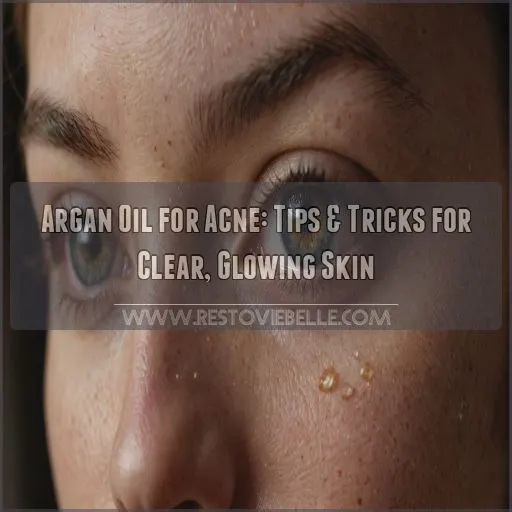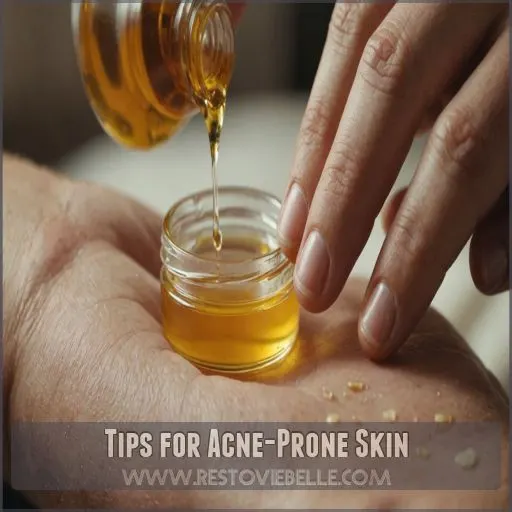This site is supported by our readers. We may earn a commission, at no cost to you, if you purchase through links.
 Ready to say goodbye to pesky pimples and hello to glowing, healthy skin? Argan oil is your new acne-fighting BFF. Just massage a few drops onto clean skin – it’ll soothe redness, calm inflammation, and hydrate without clogging your pores.
Ready to say goodbye to pesky pimples and hello to glowing, healthy skin? Argan oil is your new acne-fighting BFF. Just massage a few drops onto clean skin – it’ll soothe redness, calm inflammation, and hydrate without clogging your pores.
You can even dab it on blemishes as a spot treatment or mix it into your other skincare products for a customized routine.
And don’t forget the DIY face mask – a dollop of argan oil, yogurt, and honey makes for a nourishing, pore-refining pick-me-up.
Get ready to embrace your most radiant, acne-free complexion yet!
Table Of Contents
Key Takeaways
- argan oil is your new acne-fighting best friend – it soothes redness, calms inflammation, and hydrates without clogging pores. You can even dab it on blemishes as a spot treatment or mix it into your other skincare products.
- Argan oil’s anti-inflammatory properties and antioxidant-rich formula make it a skincare superhero. It guards your skin while providing superb hydration, without clogging those pesky pores.
- To get the most from argan oil, look for cold-pressed and pure formulas that are free of additives. Opt for organic or fair-trade options for ethical sourcing and eco-friendly choices.
- Incorporate argan oil into your routine as a moisturizer, spot treatment, or DIY face mask. Start with a small amount, be patient, and balance it with other acne-fighting products for clear, glowing skin.
Benefits of Argan Oil for Acne
When you’re battling acne, argan oil might just become your new best friend with its anti-inflammatory properties that can help calm your skin’s redness and irritation.
Packed with antioxidants and non-comedogenic hydration, it’s like giving your skin a superfood treat that won’t clog your pores.
Anti-Inflammatory Properties
Argan oil’s anti-inflammatory properties are a game-changer for acne-prone skin.
This skin-soothing superstar helps calm redness, irritation, and inflammation – the root causes of breakouts.
Massage a few drops onto clean skin and let the natural goodness get to work, soothing your complexion and paving the way for clearer, healthier-looking skin.
Antioxidant-Rich Formula
Ever noticed the buzz about antioxidant benefits? Argan oil’s formula shines here. Think of it as your skin’s bodyguard against free radical damage. Here’s how it helps:
- Neutralizes radicals: Protects skin cells.
- Reduces wrinkles: Keeps skin looking youthful.
- Rejuvenates: Freshens dull complexion.
- Evens tone: Smooths over blemishes effortlessly.
It’s like giving your skin a superhero cape!
Hydrating and Non-Comedogenic
A rich in antioxidants, it guards your skin while providing superb hydration. This miraculous oil doesn’t clog those pesky pores, making it a godsend for acne-prone, sensitive skin. When life’s a little dry, think of it as your skin’s new BFF. Check out the table below for quick perks:
| Feature | Benefit |
|---|---|
| Lightweight | Quick absorption |
| Oil-balancing | Reduces excess oil |
| Nourishing | Deep hydration |
| Skin-protecting | Enhances resilience |
| Non-comedogenic | Prevention of acne |
Soothing Redness and Irritation
Why not give your skin a breather? Argan oil can calm irritation and reduce redness, working wonders even for sensitive skin.
Here’s how it helps:
- Calming Effects: Its natural properties ease inflammation.
- Gentle Care: Suitable for all skin types, including sensitive ones.
- Protective Layer: Forms a barrier that keeps irritation at bay.
Time to pamper your skin effortlessly!
Choosing the Right Argan Oil
If you’re looking for the right argan oil for your acne-prone skin, look for cold-pressed and pure formulas that are free of any questionable additives.
While organic and fair trade options may cost a bit more, the quality is often worth the investment for your skin’s health.
Look for Cold-Pressed and Pure
Choosing the right argan oil? Always go for cold-pressed and pure varieties. It’s like picking fresh fruit over canned—better taste, better nutrients. Cold pressing preserves the oil’s natural benefits, keeping those pesky acne-fighting properties intact like jojoba oil for natural hair.
Plus, pure oil means fewer irritants. Skip refined options, as they strip away beneficial compounds. Your skin deserves the good stuff!
Check the Label for Additives
Pure argan oil’s a treasure, but additives can rain on your parade. Check labels for surprises like scents or colors. Those common additives might just be the villains in your acne story. Be a detective and watch for ingredients that don’t add benefits. You’ll thank yourself later for putting your skin’s needs first, sidestepping sneaky impostors.
- Additives to avoid for skin clarity
- Common additives lurking in skincare
- Label reading tips for savvy shoppers
Consider Organic or Fair Trade Options
Going organic or fair trade with your argan oil isn’t about jumping on the latest bandwagon; it’s about ethical sourcing and making eco-friendly choices.
Opt for products that shout sustainability, because who doesn’t like saving the planet while battling acne?
Plus, fair trade guarantees fair wages for workers. It’s a win-win: clearer skin and a clearer conscience!
Quality Over Price
In terms of argan oil, quality trumps price.
Don’t be fooled by dirt-cheap options – they’re often diluted or even fake.
Invest in a reputable, pure argan oil brand, even if it costs a bit more.
The benefits of using a high-quality, authentic product will far outweigh the initial cost.
Your skin deserves the best.
How to Use Argan Oil for Acne
To tackle those pesky blemishes, incorporate argan oil into your skincare routine as it offers anti-inflammatory benefits and is non-comedogenic.
Argan oil is versatile, so it can be used as a moisturizer, spot treatment, or in a DIY face mask.
This oil helps soothe acne-prone skin effectively (Source).
Using as a Moisturizer
Finding the perfect argan oil means choosing a cold-pressed, pure product.
Ready to use it as a moisturizer? You’re in for a treat!
Start incorporating it into your daily routine with these steps:
- Apply a few drops to clean skin.
- Gently massage using upward strokes.
- Let it absorb before layering other products.
Your skin’ll thank you!
Applying as a Spot Treatment
After moisturizing, consider using argan oil as a spot treatment. It’s like giving your skin a targeted pep talk. Simply dab a little on pesky spots.
| Aspect | Details |
|---|---|
| Application Frequency | Twice daily |
| Spot Treatment Routine | After cleansing and toning |
| Best Spot Treatment Oils | Argan, tea tree |
| Spot Treatment vs. Full Face | Focuses on problem areas |
| Suitability | All skin types |
Maintain a regular spot treatment frequency for visible results!
Mixing With Other Skincare Products
Argan oil’s versatility allows you to seamlessly incorporate it into your existing skincare routine.
Mix a few drops with your favorite serum, moisturizer, or spot treatment containing ingredients like retinol, salicylic acid, or hyaluronic acid for a customized acne-fighting regimen.
This synergistic approach can amplify the benefits of both argan oil and your other products, like using argan oil as a leave-in conditioner.
Using in a DIY Face Mask
Whipping up your own face mask with a few kitchen staples can make you feel like a skincare wizard.
Try this delightful concoction for acne-prone skin:
- 1 tablespoon of yogurt
- 1 teaspoon of honey
- 2 drops of argan oil
- Mix until smooth
Apply it twice a week—it’s like your skin’s favorite spa appointment at home!
Combining With Other Natural Remedies
Want to boost your skincare game? Try teaming up argan oil with natural pals like tea tree oil and aloe vera. Aloe soothes, honey hydrates, and turmeric battles redness.
Here’s a quick match-up:
| Remedy | Benefit | Fun Fact |
|---|---|---|
| Tea Tree Oil | Fights bacteria | Powerful punches! |
| Honey | Moisturizes skin | Sweet solution! |
| Turmeric | Reduces inflammation | Golden touch! |
Go ahead, mix and match for glowing skin!
Tips for Acne-Prone Skin
Using argan oil can be a game-changer for acne-prone skin, but like trying to fit into last year’s jeans, it’s all about patience and a balanced routine.
Start with a small amount and incorporate it with care, avoiding the urge to over-exfoliate or touch your face too often.
Start With a Small Amount
When starting with argan oil for acne, your skin’s sensitivity levels are key.
Start with just a small amount and do a patch test first to see how your complexion reacts.
Less is more – you can always gradually increase the amount, but overdoing it may lead to irritation.
It’s all about trial and error to find what works best for you.
Be Patient and Consistent
You’ve dipped your toes into argan oil, starting small, and now it’s time to add patience and consistency to your routine. Rome wasn’t built in a day, and neither is clear skin!
- Stick to your routine daily.
- Track progress.
- Remember, skin has its own timeline.
- Celebrate small victories.
- Focus on long-term goals.
Balance With Other Skincare Products
Patience pays off with skincare! Balancing argan oil in your regimen with products like retinol can be smooth sailing. Aim for harmony in your routine—serum layering and all. Here’s a quick table for guidance:
| Product | Frequency |
|---|---|
| Argan Oil | Daily |
| Retinol | 2-3 times/week |
| Hydrating Serum | Daily |
| Sunscreen | Daily |
| Gentle Cleanser | Twice daily |
Ever tried juggling with one arm? Tricky, right? Similarly, overloading products can confuse your skin. Balance is key!
Avoid Over-Exfoliating
Balancing your skincare routine is as important as breathing. It’s tempting to scrub away those pesky breakouts, but exfoliating too much can irritate and weaken your skin barrier, inviting more acne triggers. Gentle skin care calls for moderation:
- Limit exfoliation to 1-3 times a week.
- Use mild products.
- Focus on hydration.
- Watch for sensitivity.
- Listen to your skin’s needs.
Keep Your Hands Away From Your Face
Resist the temptation to constantly touch your face – those wandering hands can spread bacteria and irritate your skin, making acne even worse. Instead, be mindful of your face-touching habits. Keep your hands busy with other tasks, and try these tricks to break the subconscious cycle:
| Habit | Replacement |
|---|---|
| Resting chin in hand | Fidget with a pen or stress ball |
| Absentmindedly scratching | Wear a bracelet to remind you |
| Popping pimples | Apply a spot treatment instead |
| Leaning on face while working | Use a standing desk or prop up your elbows |
| Touching face while talking | Clasp hands in lap or behind back |
Keep your hands busy with other tasks, and try these tricks to break the subconscious cycle:
Common Concerns and Solutions
When considering argan oil for acne, you might wonder if it clogs pores or if it’s safe for sensitive skin.
Don’t worry; we’ve got answers to these common concerns and more, so you can confidently incorporate this golden oil into your skincare routine.
Can Argan Oil Clog Pores?
Worried that argan oil might clog your pores? Fear not! Argan oil is known as a non-comedogenic oil, meaning it won’t block pores or worsen acne-prone skin.
In fact, its lightweight nature helps balance oil production without suffocating your skin.
So, go ahead with confidence, and let this golden elixir work its magic on your complexion—your pores will thank you!
Is Argan Oil Suitable for Sensitive Skin?
You’ve heard argan oil won’t clog pores, but is it gentle enough for sensitive skin? Often, yes. Just check for allergic reactions with a patch test.
Here’s the lowdown:
- Non-irritating: Often soothing, reducing chances of skin irritation.
- Nutrient-rich: Packed with vitamin E for skin health.
- Light texture: Absorbs well, avoiding greasy aftermath.
Give it a whirl!
Can I Use Argan Oil With Other Acne Treatments?
Argan oil can be safely used alongside other acne treatments like retinol, benzoyl peroxide, salicylic acid, and antibiotics. In fact, the nourishing properties of argan oil can help soothe irritation and redness caused by these treatments. Just be sure to introduce new products slowly and monitor your skin’s response. A little goes a long way!
| Treatment | How to Use with Argan Oil |
|---|---|
| Retinol | Apply argan oil after retinol to hydrate |
| Benzoyl Peroxide | Mix a few drops of argan oil into BP cream |
| Salicylic Acid | Use argan oil as a calming, hydrating step |
| Antibiotics | Argan oil can help replenish skin’s moisture |
How Long Until I See Results?
Seeing results from argan oil can feel like watching grass grow—slow and steady wins the race. Be patient!
Results depend on several factors:
- Consistency: Regular use is key.
- Individual Skin Type: Some folks notice changes sooner.
- Realistic Expectations: Every face tells its own story, so give it time.
Are There Any Side Effects?
Patience is key, but you might wonder if argan oil has side effects. Well, some folks experience mild skin irritation or even argan oil allergies. Not fun, right? Use pure, high-quality oils to avoid issues.
Here’s a quick rundown:
| Concern | Solution | Notes |
|---|---|---|
| Irritation | Test on small areas | Use cold-pressed oil |
| Allergies | Stop use immediately | Look for additives |
| Excess Hair Growth | Monitor areas | Check oil type |
Stay cautious and shine bright!
Frequently Asked Questions (FAQs)
Using argan oil with other acne treatments?
You can mix argan oil with acne treatments like benzoyl peroxide or salicylic acid, but be cautious.
It’s like a dance: start slow, let your skin adjust, and watch for irritation or breakouts.
Can argan oil reduce acne scars?
Argan oil aids acne scar fading efficiently by encouraging skin cell regeneration.
It’s like giving your skin a gentle nudge to heal itself, boasting vitamin E and antioxidants.
Dermatologists suggest consistent use for noticeable results over time.
Does argan oil cause skin purging?
Argan oil doesn’t typically cause skin purging, but it may temporarily worsen acne as it unclogs pores. Give it 4-6 weeks to see if your skin adjusts.
Is argan oil safe for sensitive acne?
For sensitive skin wrestling with acne, consider giving argan oil a go—it’s generally safe and non-comedogenic.
With its anti-inflammatory and soothing properties, it might just be your skin’s new best friend.
Test a small patch first.
How to store argan oil properly?
Keep your argan oil fresh by storing it in a cool, dry place, away from direct sunlight—like a hidden treasure in a cellar. Make sure the lid’s tightly closed to prevent air and moisture from sneaking in.
Conclusion
Can argan oil truly banish acne and lead you to clearer skin? Absolutely! This liquid gold’s anti-inflammatory and antioxidant properties make it a worthy addition to your skincare arsenal.
As you explore how to use argan oil for acne, remember it’s both hydrating and gentle, ideal for daily use.
So whether you’re battling breakouts or soothing sensitive skin, argan oil’s nourishing embrace might just be your path to a glowing, acne-free complexion, just like it can nourish hair. Give it a try—your skin will thank you!









